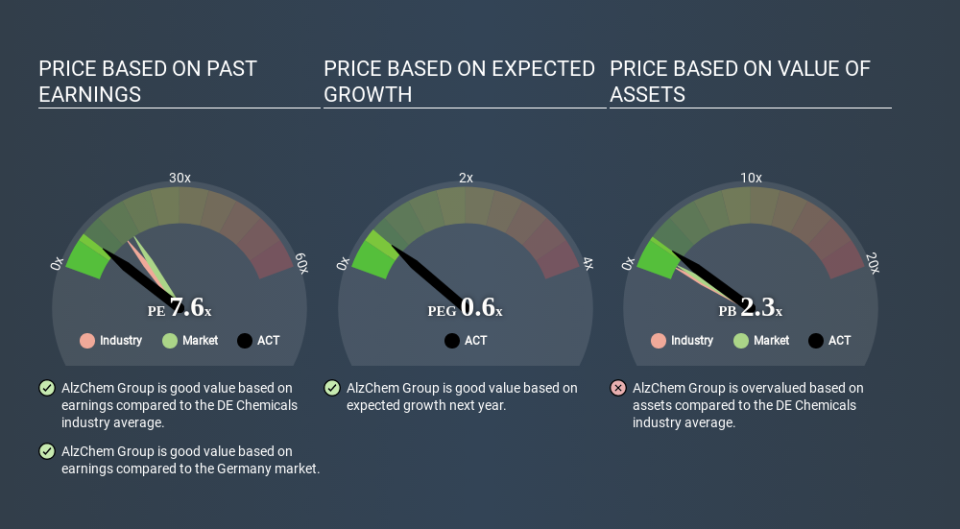How Does AlzChem Group's (ETR:ACT) P/E Compare To Its Industry, After The Share Price Drop?

Unfortunately for some shareholders, the AlzChem Group (ETR:ACT) share price has dived 30% in the last thirty days. Indeed the recent decline has arguably caused some bitterness for shareholders who have held through the 40% drop over twelve months.
All else being equal, a share price drop should make a stock more attractive to potential investors. While the market sentiment towards a stock is very changeable, in the long run, the share price will tend to move in the same direction as earnings per share. So, on certain occasions, long term focussed investors try to take advantage of pessimistic expectations to buy shares at a better price. Perhaps the simplest way to get a read on investors' expectations of a business is to look at its Price to Earnings Ratio (PE Ratio). A high P/E implies that investors have high expectations of what a company can achieve compared to a company with a low P/E ratio.
Check out our latest analysis for AlzChem Group
How Does AlzChem Group's P/E Ratio Compare To Its Peers?
We can tell from its P/E ratio of 7.64 that sentiment around AlzChem Group isn't particularly high. We can see in the image below that the average P/E (13.7) for companies in the chemicals industry is higher than AlzChem Group's P/E.
This suggests that market participants think AlzChem Group will underperform other companies in its industry. While current expectations are low, the stock could be undervalued if the situation is better than the market assumes. If you consider the stock interesting, further research is recommended. For example, I often monitor director buying and selling.
How Growth Rates Impact P/E Ratios
P/E ratios primarily reflect market expectations around earnings growth rates. If earnings are growing quickly, then the 'E' in the equation will increase faster than it would otherwise. That means even if the current P/E is high, it will reduce over time if the share price stays flat. Then, a lower P/E should attract more buyers, pushing the share price up.
AlzChem Group shrunk earnings per share by 21% over the last year. But it has grown its earnings per share by 5.1% per year over the last three years. And over the longer term (5 years) earnings per share have decreased 33% annually. This could justify a pessimistic P/E.
Remember: P/E Ratios Don't Consider The Balance Sheet
One drawback of using a P/E ratio is that it considers market capitalization, but not the balance sheet. Thus, the metric does not reflect cash or debt held by the company. In theory, a company can lower its future P/E ratio by using cash or debt to invest in growth.
Such expenditure might be good or bad, in the long term, but the point here is that the balance sheet is not reflected by this ratio.
So What Does AlzChem Group's Balance Sheet Tell Us?
AlzChem Group has net debt equal to 39% of its market cap. While it's worth keeping this in mind, it isn't a worry.
The Verdict On AlzChem Group's P/E Ratio
AlzChem Group's P/E is 7.6 which is below average (16.6) in the DE market. The debt levels are not a major concern, but the lack of EPS growth is likely weighing on sentiment. What can be absolutely certain is that the market has become more pessimistic about AlzChem Group over the last month, with the P/E ratio falling from 10.9 back then to 7.6 today. For those who prefer invest in growth, this stock apparently offers limited promise, but the deep value investors may find the pessimism around this stock enticing.
When the market is wrong about a stock, it gives savvy investors an opportunity. As value investor Benjamin Graham famously said, 'In the short run, the market is a voting machine but in the long run, it is a weighing machine. So this free report on the analyst consensus forecasts could help you make a master move on this stock.
Of course you might be able to find a better stock than AlzChem Group. So you may wish to see this free collection of other companies that have grown earnings strongly.
If you spot an error that warrants correction, please contact the editor at editorial-team@simplywallst.com. This article by Simply Wall St is general in nature. It does not constitute a recommendation to buy or sell any stock, and does not take account of your objectives, or your financial situation. Simply Wall St has no position in the stocks mentioned.
We aim to bring you long-term focused research analysis driven by fundamental data. Note that our analysis may not factor in the latest price-sensitive company announcements or qualitative material. Thank you for reading.

 Yahoo News
Yahoo News 
